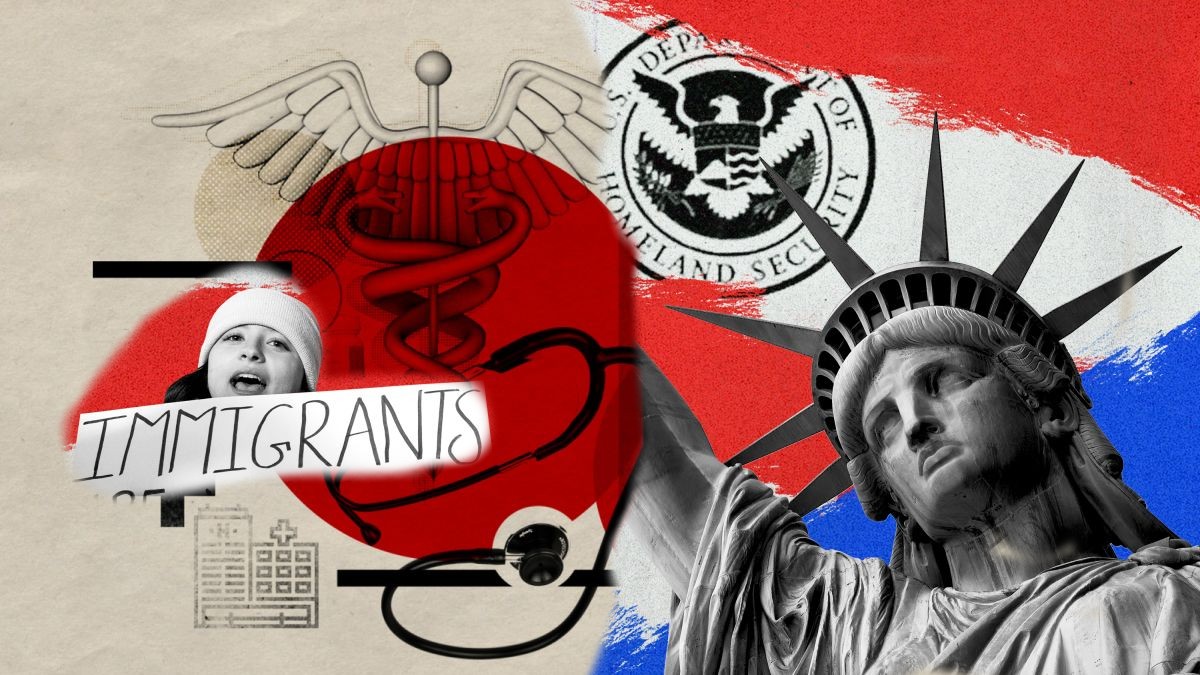US resumes expedited deportation of migrant families 2:01
(CNN Spanish) -
Immigrants in the United States face several obstacles when it comes to obtaining medical care.
However, there are some exceptions available to undocumented people.
According to the Kaiser Family Foundation, among the reasons why immigrants do not have health coverage are recent changes in immigration policies, the impact of the covid-19 pandemic, and restrictions on eligibility for insurance. government doctor.
However, the situation is even more complicated for unauthorized immigrants, as while more than half are employed, a large number do not have employer-sponsored health insurance.
And that's compounded by limited access to federal health care programs available to unauthorized immigrants.
Why does covid-19 impact Latinos in the US more than other groups?
Limited access to legal residents
By 2018, about 44.8 million migrants lived in the United States, and an estimated 11.4 million did not have regular immigration status, according to figures from the Department of Homeland Security (DHS).
DHS defines an unauthorized immigrant population as all foreign-born noncitizens who are not legal residents because they entered the US without authorization or were admitted temporarily.
Recipients of programs such as Temporary Protected Status (TPS) and Deferred Action for Childhood Arrivals (DACA) are considered unauthorized immigrants.
"Unauthorized immigrants applying for an adjustment to LPR (legal permanent residence) status under the Immigration and Nationality Act (INA) are considered part of the unauthorized resident population until they have been granted legal permanent residence," it says. DHS.
advertising
Thousands of immigrants bound for the United States were stranded in Necoclí, Colombia
When it comes to health coverage, immigrants who are not citizens are more likely to not have health insurance.
According to a report published in July by the Kaiser Family Foundation, 23% of legally present immigrants in the US and 46% of undocumented immigrants are uninsured, compared with more than 9% of US citizens. .
While the United States has reduced the number of uninsured people through the Affordable Care Act (ACA), the ACA stipulates that if you are an undocumented immigrant, "the individual will not be treated as an individual. qualified and may not be covered by a qualified health plan in the individual market that is offered through an exchange.
How to apply for asylum in the United States?
We explain it to you step by step
And when it comes to buying health insurance directly from a health insurance company, these are often unaffordable without assistance.
In the case of California - home to the largest number of immigrants in the country - undocumented immigrants who wanted to buy insurance through
Covered California
were prevented by federal law, the California Institute of Public Policy said.
According to the most recent report by the Public Policy Institute of California (PPIC), fear of deportation is also one of the factors that can make undocumented immigrants less willing to compromise with state agencies and therefore , have lower rates of coverage compared to permanent residents.
The request for medical care and the "public charge"
The final Public Charge rule established in August 2019 ceased to be in effect in March 2021, so the United States Citizenship and Immigration Services (USCIS) no longer considers applying for or receiving Medicaid o CHIP — or other public housing or nutrition assistance programs — as part of the public charge inadmissibility determination.
This means that your chances of becoming a lawful permanent resident or US citizen are not affected by participating in these programs.
Latinos are optimistic about America's future despite being hit by the pandemic, according to a Pew poll
However, the US government stipulates that there is an exception for those who receive long-term medical care in an institution run by the government, such as a nursing home or a mental health institution, as these people could face obstacles to obtain a green card for permanent residence.
Doctors seek to support immigrants due to coronavirus 3:01
Health Care Options for Undocumented Immigrants
“Qualified non-citizens” are generally eligible for coverage through the Health Insurance Marketplace, or through Medicaid and Children's Health Insurance (CHIP).
In this category are legal permanent residents, asylees, refugees, victims of human trafficking, among others.
And while undocumented immigrants are not eligible for most of the benefits listed above, there are some exceptions.
For example, in the case of a hospital emergency, the law stipulates that if someone - whether or not eligible - goes to the emergency department "the hospital must provide an appropriate medical screening ... to determine whether or not they are treated. of an emergency medical condition. "
If the person is determined to have an emergency medical condition, the hospital must provide the treatment required to stabilize the medical condition or transfer the person to another medical facility.
Department of Homeland Security Says Undocumented Immigrants Should Also Be Vaccinated Against Coronavirus
For its part, Medicaid provides emergency services to undocumented immigrants for the treatment of emergency medical conditions, as long as the person complies with the other Medicaid eligibility rules, depending on their state of residence.
And in certain states, children and pregnant women can get health coverage regardless of immigration status, according to the National Center for Immigration Law.
States such as California, New York, Texas, among others, use CHIP funds to offer coverage to undocumented pregnant women, since although the woman as such is not eligible for medical coverage, the fetus is eligible.
However, the American College of Obstetricians and Gynecologists indicates that this leads to exclusion from essential perinatal services, such as postpartum care.
Immigrants in New York ask for equality in aid 3:29
Immigration Immigrants in the U.S.








/cloudfront-eu-central-1.images.arcpublishing.com/prisa/YLOEMFF4HJC23HMOYLNKJIYY3A.jpg)






